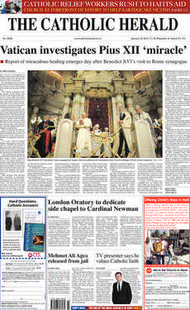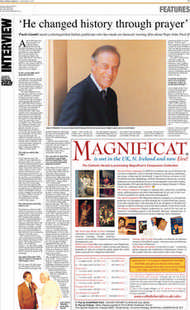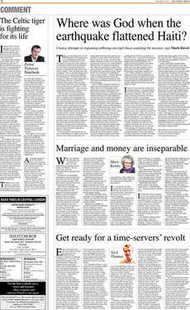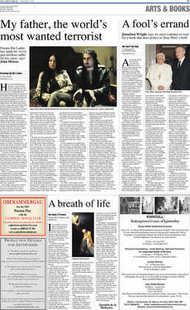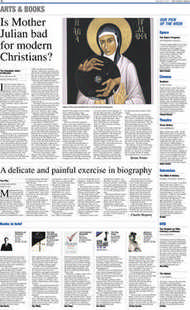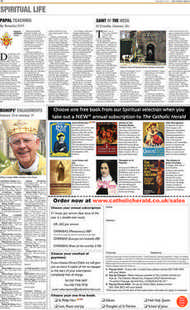Page 1, 22nd January 2010
Page 1

Report an error
Noticed an error on this page?If you've noticed an error in this article please click here to report it.
Tags
Share
Related articles
Pope Benedict Defends Role Of Wartime Pontiff
Vatican Congregation Sets Wartime Pope On The Road To...
Vatican Plans To Open Secret War Archives
A Long Way To Go
Secret Papers Vindicate Pope Pius Xii, Says Jewish Scholar
Open Secret Archives, Demands Vatican Holocaust Commission
Vatican investigates Pius XII ‘miracle’
BY SIMON CALDWELL
THE VATICAN is investigating an alleged miracle that could put the wartime pope Pius XII just one step away from canonisation.
An unnamed person in Castellammare di Stabia in southern Italy has claimed to have been healed from cancer after praying to Pope Pius.
The Vatican is keeping secret the identity of the person who claimed to be healed at the intercession of Pius XII. One Italian news outlet said the patient was a man with prostate cancer but another said it was a woman who developed a cancerous tumour when she became pregnant in 2005.
According to one version, the woman’s husband said he began to pray to Pope John Paul II, who had died that year. The man then had a dream that John Paul II asked him to turn to another pope for help, and showed him a picture of Pius XII. The man did as requested and his wife was later cured. Doctors have said they cannot explain what happened scientifically.
After examining the patient’s medical records the Vatican has asked Archbishop Felice Cece of Sorrento to set up a diocesan tribunal to investigate the claims further.
“It is true,” said Fr Carmine Judges, vicar general of the archdiocese. “The Holy See has told us that it has been approached by a faithful of our diocese who claims to have received a miracle through the intercession of Pope Pius XII.
“The archbishop has decided to establish the diocesan tribunal,” he told Italian online magazine Petrus. “Of course caution is in order but after briefly checking the records of the person in Castellammare di Stabia it would seem that a miracle has taken place and that all the elements and conditions exist to beatify the angelic pastor.” Pope Benedict XVI declared Pius Venerable in December, meaning that the Church recognised that he lived a life of “heroic virtue”. The historical record is still under scrutiny, however, and the Vatican will open its wartime archives in 2013 after it has finished cataloguing millions of documents into thousands of folders and files. It has doubled its staff to speed up the process.
A beatification ahead of the opening of the archives would be controversial because historians remain divided about whether Pius did enough to save European Jews from the Holocaust.
On Sunday Riccardo Pacifici, the president of Rome’s Jewish community, told the Pope during a visit to Rome’s main synagogue, that “the silence of Pius XII before the Shoah still hurts because something should have been done”.
Dr Edward Kessler, director of the Woolf Institute of Abrahamic Faiths at Cambridge University, predicted that the beatification of Pius XII would cause problems for dialogue between Catholics and Jews.
“There is a general feeling that Benedict XVI is pushing for the beatification of Pius XII,” he said.
“The mainstream Jewish position, and many Catholics involved in Catholic-Jewish dialogue, would see this as problematic not just because of the silence of Pius XII but also because many of the archives have not been opened. It seems hasty. There remain serious questions about Pius’s actions during the Second World War. Clearly, he did some things, but did he do enough and did he do it soon enough?
“There is a general acceptance that this [beatification] is going to happen but for many Catholics and Jews involved in Catholic-Jewish relations it is disturbing.” But others such as British historian Sir Martin Gilbert, the world’s leading expert on the Holocaust, and Rabbi David Dalin, an American historian, claim that Pius should be considered a “Righteous Gentile” because he saved lives by hiding Jews in the religious houses of Rome.
Gary Krupp, president of Pave the Way Foundation, which is fighting to restore the reputation of Pope Pius, said: “Through our research of documented proof, we discovered that secretly he saved more Jews than all of the world’s religious and political leaders combined. He did this anonymously where no one knew that he acted to save them. In Judaism this is the highest form of charity ac cording to our tradition.” The key to the historical verdict on Pius may rest on his activities of October 16 1943 when the SS began to round up the 8,000 Jews of Rome for deportation. A total of 1,007 Jews were sent to Auschwitz but the remaining 7,000 were hidden in Church institutions.
A total of 477 of these were smuggled into the Vatican and some 3,000 were given shelter in Castel Gandolfo, the Pope’s summer residence near Rome, and provided with kosher food.
Some Jews were equipped with fake baptismal certificates and disguised as priests, while the nuns of one convent gave up their beds to Jewish women.
Documentary evidence has recently emerged to show that the Jews were hidden on the direct but secret orders of the Pope. Avner Shalev, the chairman of Yad Vashem, said last year that such evidence “would certainly result in a significant improvement in our relations with the Vatican”.
Critics, however, say that Pius did not speak out against the deportation of the 1,007 – although his Secretary of State, Cardinal Luigi Maglione, protested vigorously to Ernst von Weizsacker, the German Ambassador.
The captives were taken by train to Mauthausen labour camp in Austria and held there for two days. Then on a direct order from Berlin they were transported to their deaths in Poland.
Historians hope Vatican records will reveal if Cardinal Maglione tried to intervene on the Pope’s instructions or if he acted on his own initiative.
Defenders of Pius have argued that he had no choice but to act prudently or it would have been impossible to save lives. He was also aware of a plan by Adolf Hitler to kidnap and later kill him, and supporters argue that any gesture provoking the Nazis would have resulted in the deaths of Jews hiding in churches.
Hitler’s plot was devised after the pope, in his Christmas message of 1942, lamented those who “solely because of their nation or race have been condemned to death or progressive extinction”, leading the SS to accuse Pius of acting as “the mouthpiece of Jewish war criminals”.
Most evidence in defence of Pius has come from Jewish historians who since the 1960s have established that the Catholic Church saved more lives than all the international agencies put together. The Israeli diplomat Pinchas Lapide estimated that it saved up to 850,000 Jews from death. He based his assessment on Yad Vashem’s records.
blog comments powered by Disqus


